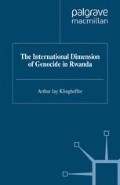Abstract
The United States did not favor either direct or United Nations military intervention to stop the killings as it maintained that the process of peacemaking had become dangerously overutilized, and that Rwanda was of marginal strategic importance. Washington did, however, advocate non-military humanitarian action and legal prosecution of the perpetrators. President Clinton’s initial reaction to the dual presidential assassinations, and the killing of Agathe Uwilingiyimana, typified the US response as he called for national reconciliation and an end to the violence.1 The American position was thus one of regret and non-partisanship, with no intimation of strong action.
Access this chapter
Tax calculation will be finalised at checkout
Purchases are for personal use only
Preview
Unable to display preview. Download preview PDF.
Notes
Holly Burkhalter, ‘A Preventable Horror?,’ Africa Report, vol. 39, no. 6 (November–December 1994): 19–20
Burkhalter, ‘The Question of Genocide: The Clinton Administration and Rwanda,’ World Policy Journal, vol. XI, no. 4 (Winter 1994/95): 47–48 and 52; and testimony of George Moose, ‘Conflict Resolution in Africa: Recent Developments,’ Subcommittee on Africa, House Committee on Foreign Affairs, June 8, 1994 ( Washington: U.S. Government Printing Office, 1995 ), p. 9.
Milton Leitenberg, ‘Rwanda, 1994: International Incompetence Produces Genocide,’ Peacekeeping and International Relations (November/ December 1994): 8–9. Leitenberg cites an interview with Perry on the McNeill-Lehrer News Hour, PBS television, July 27, 1994.
See Thomas Weiss, ‘Overcoming the Somalia Syndrome: “Operation Rekindle Hope?”,’ Global Governance, vol. 1, no. 2 (May–August 1995): 172 and 179. When Clinton began his policy review in February 1993 he intended to be more interventionist in the Third World, but events in Somalia then changed his perspective. PDD 25 then represented ‘a policy of stringent conditionality.’ See Leitenberg, p. 8.
Eleanor Clift and Tom Brazaitis, War Without Bloodshed ( New York: Scribners, 1996 ), p. 304.
Author information
Authors and Affiliations
Copyright information
© 1998 Arthur Jay Klinghoffer
About this chapter
Cite this chapter
Klinghoffer, A.J. (1998). American Reticence. In: The International Dimension of Genocide in Rwanda. Palgrave Macmillan, London. https://doi.org/10.1057/9780230375062_11
Download citation
DOI: https://doi.org/10.1057/9780230375062_11
Publisher Name: Palgrave Macmillan, London
Print ISBN: 978-1-349-40683-8
Online ISBN: 978-0-230-37506-2
eBook Packages: Palgrave Political & Intern. Studies CollectionPolitical Science and International Studies (R0)

